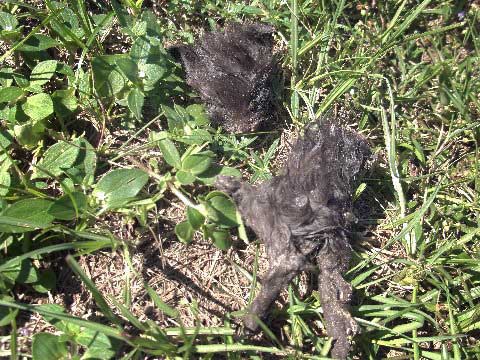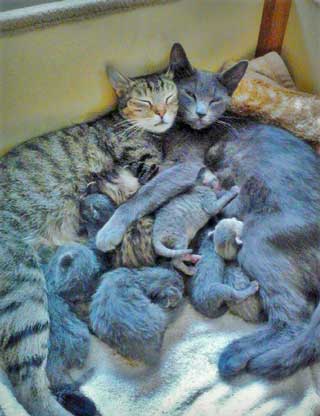A couple of scientific reports indicate to me that when the domestic cat is left to their own devices such as in rural locations e.g. as barn cats, their behaviour is very similar to that of lions living in the African Serengeti. People think of lion pride behavior as unique in the cooperation between female lions to raise their young and with gangs of male lions as outsiders occasionally coming into the pride to take it over and committing infanticide in order to procreate their own offspring.

Male cat infanticide
It appears that this isn’t the case. In one study1 published in 1999 they found that there had been six cases of male domestic cat infanticide within a rural location which I will take to be barn cats. They state that their study report was the first time that infanticide had been witnessed directly and described in domestic cats.

Different male cats, which of course were unsterilised and living a semi-wild life, killed kittens within their first week of life. In other words, all the kittens were killed as newborns.
They also state that:
“The killing pattern was generally the same as that described in lions. All females reacted aggressively but could not prevent the infanticide.”
This is reminiscent of female lion behaviour.
They made three suggestions as to why the infanticide had taken place:
- The first of which is that the domestic cats were behaving like African lions in killing the offspring of females in order to mate with those females to create their own offspring. They describe this as “a remnant of cat male reproductive strategy selected in the original environment”. I have interpreted that statement.
- The second suggestion is that the environment in which they lived created selection pressures which encouraged some males to commit infanticide. I interpret this to mean that some male cats decided to behave like male lions because of the need to pass on their genes and breed. This, as we know, is an innate trait of male domestic cats. And because of competition between the males some were driven to kill newborn kittens of unrelated females
- A third suggestion was that this was an aberration in male domestic cat behaviour caused by the environmental conditions under which they lived which possibly included disturbance by humans. This was pressure applied to them by human interference which resulted in abnormal behaviour.
The interesting aspect of this study is that there is a parallel behaviour in male domestic cats under certain circumstances to male lions in the wild.
Female cooperation
In a separate study 2, published in 1987, they observed farm cat colonies of up to 30 cats. These cats were dependent to a certain extent on food provided by people. The farms were in England. Once again there appears to have been a similarity in their behaviour to that which we see in female lions in that there was cooperation between the females in raising their young.

They state that:
“Adult females used communal nests, tended, groomed and nursed kittens other than their own, and cooperated with each other during parturition.”
They observed one case of male cat infanticide. The adult male was unrelated to the females and they state that it was not a unique case.
They also state that farm cat society is structured centripetally. In this context, I take this word to mean that there is a core society which is a female group supporting each other with peripheral individuals i.e. those on the periphery of the core society.
Study 1: Infanticide in rural male cats (Felis catus L.) as a reproductive mating tactic.
Study 2: Social dynamics, nursing coalitions and infanticide among farm cats, Felis catus..
Below are some more articles on infanticide.


This is an interesting and not uncommon situation, and your commenter is right to ask whether it’s normal. Here’s a breakdown of what’s happening and some guidance you could offer:
—
### 🐾 **Is this normal behavior?**
Yes, it *is* normal, especially in outdoor or semi-feral cats. Although we often think of cats as social, especially when they’re related, feline society is more complex and territorial than people realise.
In this case:
* **The mother cat is showing territorial aggression**, which is particularly common among female cats.
* Once her kittens reached adulthood (around 1 year old), they stopped being “her babies” and started being seen as competitors—especially **other females** who might threaten her territory or access to food and shelter.
* This aggression can be intensified if the cats are not spayed/neutered, but **even spayed cats can be territorial**. Hormones aren’t the only factor; space and resources matter too.
—
### 🏡 **How do we get our spayed cat (the daughter) home again?**
Here are a few suggestions:
1. **Create a safe, neutral entry point:**
* Try putting out a second food source and shelter spot further from the dominant cat’s “zone.”
* Use **two entrances** if possible—one the mother doesn’t guard closely.
2. **Gradual reintroduction indoors:**
* If the daughter is used to being indoors and wants to return, try coaxing her in **when the mother is not outside**.
* Use food or a familiar smell (blanket or toy) near the door to encourage her in.
3. **Manage the mother cat’s behaviour:**
* Consider using **calming diffusers (like Feliway)** indoors to reduce aggression.
* Make sure the mother is spayed—if she’s not, it could exacerbate the behaviour.
4. **Separate indoors if needed:**
* Once the daughter is inside, you might need to **keep her separate at first** and reintroduce gradually, using the “scent-swapping” technique (rubbing cloth on one cat, letting the other smell it, and vice versa).
—
### 🧠 A final thought:
Cats have a **loose social structure**, unlike dogs. Even related cats often don’t remain bonded long-term unless raised in a very stable, enclosed environment. What we call “family” doesn’t always hold the same meaning for them once kittens mature.
We have some cats living outside.
1 female offspring of one of the feral cats has taken over our backyard.
This female had 4 kittens(2 male, 2 female) which we brought into our house.
Now, the mother of those kittens, who are approximately 1 yr old, chases away all female cats that enter our yard, including her own offspring. Now one of her girls can’t get to the back door.
Is this normal behavior?
How do we get our spayed cat home if this is going on?